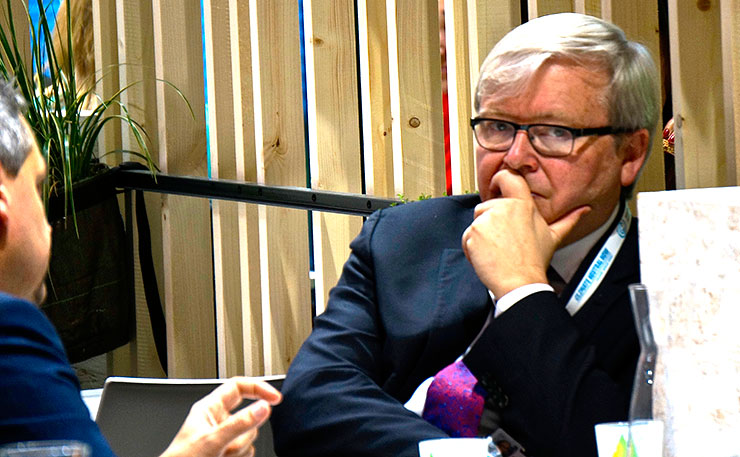The completion of the Garnaut Climate Change Review marks the squandering of yet another critical year in talk, talk, talk. The Rudd Government utterly fails to grasp the urgency of the global warming threat, and remains oblivious to the quick and cost-effective actions that could put Australia well on the way to major reductions in greenhouse gas emissions.
Once he’d received Treasury’s baleful input, Garnaut concluded that emissions cuts would be so costly we could only afford a 10 per cent cut by 2020. On cue, the Business Council of Australia chimed in with the claim that emissions cuts would wreck the economy and force major industries “offshore”.
Let’s get things clear: the BCA and Treasury are the problem, not the solution. The BCA, obviously enough, represents the big polluters who want to continue what they’re doing. They want us, the taxpayers, to pay for any marginal abatement that might still be feasible.
And Treasury? For starters, it’s full of economists. Economists seem, for no good reason, to be totally ignorant of cheap savings already being accomplished that could be spread through the economy. A recent McKinsey report, An Australian Cost Curve for Greenhouse Gas Reduction, concluded that via efficiency improvements, Australia could cut emissions by the equivalent of 70 million tonnes per year by 2020 — and save money in the process.
For example, we waste huge amounts of energy, and money, pushing air, water and electricity through ducts, pipes and wiring that are smaller than optimum. If those savings were spent on other efficiency measures, a further 200 million tonnes could be saved by 2020. This represents a 20 per cent cut in emissions by 2020 at no net cost to the economy.
Mainstream economists cling to theories that bear no useful resemblance to how real economies work. Among these absurdities is the assumption that we all routinely and accurately predict the future and rationally map our course through it. They practice a pseudoscience, which is one reason the global economy is currently threatening us with total collapse.
Australia’s problem is that our Government only hears mainstream economists and Big Money, who have achieved a strangle-hold on advice and lobbying. And thus, Kevin Rudd is failing to lead on Australia’s most critical issue. His failures are several. He’s a micromanager. He’s in the Labor Party. He doesn’t make the effort — the 2020 Summit notwithstanding — to cut through the filtered daily briefing bulls**t and tap into the full range of information out there.
During the war Churchill arranged special communication channels to ensure he heard all the war news, no matter how bad. He knew Britain would have no hope unless he had a clear and complete view of the monster he was grappling with. Rudd needs to spend more time listening to scientists and less time to economists and lobbyists. Let’s run through a set of familiar figures.
On current, post-IPCC scientific assessments, allowing atmospheric greenhouse gas levels to reach 550 parts per million (ppm) — which Garnaut regards as nearly inevitable ) — is almost certain to trigger runaway feedbacks that will take us into global disaster. The 450 ppm level that Garnaut regards as barely feasible is almost certain to cause major damage, including the total loss of the Great Barrier Reef and heavy losses of water and land productivity — and still to seriously risk runaway. And according to NASA climate scientist James Hanson, a level of 350 ppm, which we have already passed, is the likely limit within which damage is serious but manageable. This means we need to quickly stop and reverse the current rapid increase in greenhouse gases.
The Rudd Government’s pig-headed insistence on its pre-election target of a 60 per cent reduction by 2050 almost guarantees disaster for Australia — and for the world if that’s all the world will agree to. The quickest and most cost-effective way to reduce emissions is through dramatic improvements in the efficiency with which we use energy. Efficiency, of course, does not mean doing without, it means doing the same with less.
The Labor Party’s failure is its pursuit of power at any cost. This leaves it with no vision to offer, and it leaves it at the mercy of party thugs, policy fads and ideologues. Worse, it has put the party in debt to and fear of Big Money. The Coalition is no better of course, just a little less hypocritical in this regard.
Garnaut says global warming is a diabolical policy challenge, but that’s only true if you try to address it from the old paradigm, and to take care of old mates. In the new paradigm of efficiency and new, Earth-friendly industries, fixing global warming and living well are the same thing. There is no diabolical dilemma.
Rudd has said he doesn’t want to wake up in 2020 and realise there was more he could have done. He needs to wake up a lot sooner than that. Austalia needs leadership. It needs leaders who govern for us, the people, and for our children. We need to cut the coal industry loose, it has no future. We need to embrace the new industries that are rapidly developing, some of them using Australian technology but being developed in China and California. We need to see the opportunity within the crisis.
We don’t have to wait for the world, it’s well worth our while to cut greenhouse emissions starting tomorrow. We can lead the world and show it how. The only thing stopping us is our own collective blindness.
Donate To New Matilda
New Matilda is a small, independent media outlet. We survive through reader contributions, and never losing a lawsuit. If you got something from this article, giving something back helps us to continue speaking truth to power. Every little bit counts.




